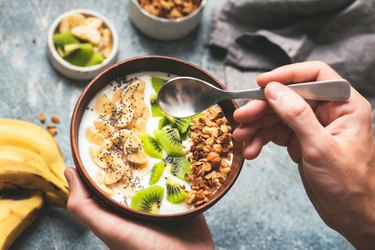
Constipation doesn't look the same for everyone. One person might normally poop twice a day, while another might go every other day — both can be perfectly healthy.
But when you're thrown off your routine — whether that means only pooping once a day or only pooping once a week — you might be looking for natural remedies for constipation that work, and fast.
Video of the Day
Video of the Day
What Is Constipation?
Medically speaking, constipation is defined by the following symptoms, says Ashkan Farhadi, MD, a gastroenterologist at MemorialCare Orange Coast Medical Center in Fountain Valley, California:
- Fewer than three bowel movements in a week
- Dry, hard or lumpy stool
- Pain or difficulty when passing stool
- Incomplete bowel movements (feeling like you aren't able to pass all your stool)
What Causes Constipation?
There are many causes of constipation, including not getting enough fiber, getting too much sodium, dehydration and a sedentary lifestyle.
But occasional constipation doesn't always warrant a trip to the doctor. In fact, there are plenty of old-fashioned remedies for constipation you can try when things get backed up.
Here are the most effective and trustworthy natural home remedies to relieve constipation.
1. Do Some Light Exercise
One sneaky cause of constipation is a lack of physical activity, according to Harvard Health Publishing.
For instance, you may notice a change in your bathroom habits after taking a long trip and sitting for extended periods of time, or perhaps transitioning to remote work and becoming less active throughout the day.
So to both help relieve and prevent constipation, Dr. Farhadi recommends you get moving to the extent that you're able.
Exercise is a first-line treatment for managing constipation naturally, according to a 2017 review in the Handbook of Experimental Pharmacology. And a more recent February 2019 review and meta-analysis in the Scandinavian Journal of Gastroenterology found exercise has significant benefits when it comes to relieving constipation, although researchers noted that more rigorous studies need to be done in this area.
Just be aware that the opposite end of the spectrum — lots of high-intensity workouts or long-distance running, for example — can cause problems, too. If you go overboard with exercise, the release of stress hormones or dehydration could lead to constipation, Dr. Farhadi says.
The solution? Regular, moderate levels of activity such as walking and yoga is best to help keep your bathroom trips consistent. A good benchmark is the Physical Activity Guidelines for Americans recommendation to get at least 150 minutes a week of moderate-intensity exercise such as walking or biking.
2. Drink More Water (but Don’t Overdo It)
Because not drinking enough liquids is a common cause of constipation, staying hydrated is one of the simplest home remedies for constipation, according to the University of Rochester Medical Center, which recommends water and juice as the best fluids to drink.
But that doesn't mean you need to be chugging water 24/7. A frequently cited August 2010 paper in Nutrition Reviews notes increasing fluids only works against constipation in people who are dehydrated. So going beyond your body's fluid needs likely won't help you poop. (And despite what you may have heard about drinking warm lemon water for constipation, there's nothing special about that particular combo.)
If you're going running and it's 90 degrees out, by all means, bring a water bottle along. Otherwise, stay reasonably hydrated and you should be just fine.
Tip
Most people need to drink between 9 and 12.5 cups of water each day to stay well hydrated, according to the Academy of Nutrition and Dietetics. If your pee is light yellow to clear, that's a sign your hydration levels are on target.
3. Eat Fiber-Rich Foods
Getting enough fiber in your diet can help with constipation, Dr. Farhadi says. In fact, a May 2016 systematic review and meta-analysis in Alimentary Pharmacology and Therapeutics found 77 percent of people with chronic constipation benefited from upping their fiber.
Fiber binds with water, which increases stool bulk and frequency and reduces the amount of time stool spends in the intestines, according to a November 2015 paper in the Journal of the Academy of Nutrition and Dietetics.
Because excessive fiber intake from fiber supplements has been linked to GI issues, the best course of action is to eat foods naturally high in fiber, such as whole grains, beans, fruit and vegetables.
The Academy of Nutrition and Dietetics recommends adults aim for 14 grams of fiber for every 1,000 calories they eat. For most people, that's between 25 and 38 grams each day, but many of us fall short of these recommendations.
How to Safely Add More Fiber to Your Diet
When adding fiber to your diet, increase the amount you eat gradually to avoid side effects such as gas and bloating.
Also be sure to drink at least eight glasses of water daily because it makes the fiber more effective. As insoluble fiber travels through your intestines, it traps water, which increases stool bulk, adds moisture and makes it easier to have a bowel movement.
Fruit is a great source of fiber, so you'll want to include plenty in your diet to meet your fiber goals. When you're eating fruit for fiber, be sure to snack on the flesh as well as the skin — otherwise you'll be missing out on fiber as well as essential vitamins and minerals.
For example, close to half of an apple's fiber is lost when you peel away the skin, per the USDA.
Like fruit, vegetables can also help with constipation, and that's because they, too, are rich in fiber.
Green peas are often cited as reliable constipation relievers, and that's probably because they're small in size but mighty when it comes to their fiber content.
A one-cup serving of green peas packs in 8.8 grams of fiber, which, especially when compared to other types of peas, is a substantial amount. Some people say that peas can cause constipation, but the opposite is true.
Not a fan of peas? A medium baked sweet potato has 3.8 grams of fiber, and a cup of Brussels sprouts has 4.1 grams. Other great sources include broccoli, carrots, green peppers, celery and spinach.
You can also add a fiber supplement to your diet, but Dr. Farhadi warns you shouldn't overdo it. Stick to the amount recommended on the packaging, or you could end up with excess gas and bloating and no bowel movement to show for your efforts.
Flaxseeds are another excellent source of fiber that may ease your constipation. One ounce of whole flaxseeds has about 8 grams of fiber. You can easily add these seeds to your oatmeal, smoothies or yogurt.
Even more impressive are chia seeds, which have about 10 grams of fiber per one-ounce serving. You can also add these to your breakfast foods, or you can make a chia pudding to reap the tiny seed's benefit.
The chart below presents some of the best fruits and vegetables for constipation relief, as well as some grains that can also help get the job done.
High-Fiber Foods
Food | Fiber in Grams |
|---|---|
Avocado (1 medium) | 14 |
Flaxseeds (3 tbsp.) | 10 |
Green peas (1 cup) | 8.8 |
Bulgur (1 cup) | 8.2 |
Raspberries (1 cup) | 8 |
Edamame (1 cup) | 8 |
Artichoke (1 medium) | 7 |
Black, kidney or pinto beans (1/2 cup) | 7 |
Pearled barley (1 cup) | 6 |
Pear (1 medium) | 5.5 |
Almonds (1 oz., or about 23) | 3.6 |
4. Drink Coffee
Yes, coffee can trigger a bowel movement. For some people, coffee is a natural laxative that makes them poop almost immediately and one of the best drinks to relieve constipation.
Caffeinated coffee seems to increase the amount of acid your stomach produces as well as boost movement along the colon, which can have a laxative effect, per a June 2017 review in the World Journal of Gastroenterology.
Keep in mind, though, that coffee doesn't make everyone poop. And don't overdo it on caffeine: The FDA recommends limiting the stimulant to 400 milligrams a day (or about four to five cups of home-brewed coffee).
Tip
Drinking other acidic beverages — like apple cider vinegar for constipation — does not appear to have the same effect when it comes to promoting bowel movements.
5. Try Prunes or Prune Juice
Prunes (dried plums) are one of the classic old-fashioned remedies for constipation.
And prune juice is one of the best fruit juices for constipation. An October 2013 review in Critical Reviews in Food Science and Nutrition found prunes and prune juice are effective in preventing constipation.
Another review, published August 2014 in Alimentary Pharmacology and Therapeutics, found eating prunes is even more effective than taking medications with psyllium (a type of fiber commonly found in some supplements for constipation).
Drinking prune juice in the morning can be very effective for constipation relief, Dr. Farhadi says, but it can also lead to significant gas and bloating if you drink too much, so start with the recommended serving size (that's a half-cup, per the USDA).
If you'd rather eat your prunes, the recommended serving size is four to five of the dried fruits, per the USDA.
6. Add Probiotics to Your Diet
Probiotics are living microorganisms that naturally exist in your gut and occur in some foods, and some research taps probiotics as a home remedy for constipation.
An October 2014 meta-analysis in The American Journal of Clinical Nutrition found probiotics helped soften stools, making them easier to pass. And in the 14 studies they analyzed, probiotics increased the number of weekly bowel movements by 1.3.
In another study, published January 2015 in the Journal of Neurogastroenterology and Motility, researchers said probiotics produce short-chain fatty acids that may improve gut movements, making it easier to poop.
Foods containing probiotics include:
- Yogurt
- Kefir
- Sauerkraut
- Kimchi
- Miso
- Tempeh
- Some fermented cheeses
7. Sip a Cup of Senna Tea
Senna tea (made from the leaves of the senna plant) is on the list of drinks that help with constipation. Certain compounds in senna known as glycosides cause muscle contractions in the intestines, which lead to a bowel movement, per the National Center for Biotechnology Information.
Taking senna by mouth (such as drinking senna tea) is effective for the short-term treatment of constipation, according to the U.S. National Library of Medicine.
Senna is a popular herbal laxative that can be found in teas such as Traditional Medicinals Organic Smooth Move Tea ($24.37 for 96 tea bags, Amazon).
These teas generally produce a bowel movement within six to 12 hours, which is why it's suggested to drink a cup at night before bed in order to poop in the morning.
Keep in mind, though, that any regular use of a laxative — even a natural laxative — will condition your body to become dependent on the laxative to go and require more of the medication over time, Dr. Farhadi says. So, he suggests only resorting to a laxative as needed, and not often.
8. Switch to Dairy-Free Alternatives
While there's no one best diet for constipation, research suggests cutting out dairy products may offer relief for some people.
For example, some children with chronic constipation experienced improvements when they stopped drinking cow's milk, per a February 2008 systematic review in Nutrition & Dietetics. And in a more recent January 2013 study in Nutrients, many children experienced constipation relief when they switched from drinking cow's milk to soy milk.
While more research around milk and constipation is needed, there are anecdotal findings that support cutting out milk products to relieve gastrointestinal symptoms like gas and bloating, which are often associated with constipation, per Johns Hopkins Medicine. You might try removing all foods made with cow's milk, including milk, cheese and ice cream, to see if you can decrease your symptoms.
Consider alternative milk products to be part of your anti-constipation diet. Substituting soy milk or almond milk for cow's milk in general may decrease the likelihood of constipation.
9. Train Your Body to Go
OK, time for a fun fact: Did you know that you can actually make yourself poop when you want to?
It might be news for many of us, but Dr. Farhadi assures it's possible. He calls it gut conditioning, and it boils down to training your body to recognize when it's time to go.
He points out that many people's busy lifestyles often cause them to suppress the urge to go when nature calls — and over time, the constant suppression could lead your body to simply stop sending out the cues.
The solution to this is setting up a time that works for you and your schedule to train your body when to poop. Pick a time in your schedule when you want to train your body to have a bowel movement and stick to it.
During that time, sit on the toilet for 15 minutes, but don't strain or force yourself to go. Just sit there, every day at the same designated time. Eventually, Dr. Farhadi says, after about 10 to 15 days, your body will pick up on your cues and deliver.
What About Baking Soda for Constipation?
You may come across some suggestions to drink a mixture of baking soda and warm water when you're constipated. However, there's no evidence this treatment works to relieve constipation.
When to See a Doctor
If these home remedies for constipation don't deliver relief, it might be time to speak to a medical professional about your symptoms.
Discuss constipation with your doctor if it seems to come out of nowhere or doesn't improve with the tips above.
You should also always talk to a doctor about constipation accompanied by the following, according to the Cleveland Clinic:
- Severe abdominal pain
- Nausea and vomiting
- Blood in your stools
- Unexplained weight loss
- Loss of appetite
- Academy of Nutrition and Dietetics: "Fiber"
- Harvard Health Publishing: "Common causes of constipation"
- Academy of Nutrition and Dietetics: "How Much Water Do You Need"
- World Journal of Gastroenterology: "Diet in irritable bowel syndrome: What to recommend, not what to forbid to patients"
- FDA: "Spilling the Beans: How Much Caffeine is Too Much?"
- Critical Reviews in Food Science and Nutrition: "Dried Plums and Their Products: Composition and Health Effects–An Updated Review"
- Alimentary Pharmacology and Therapeutics: "Systematic review: the effect of prunes on gastrointestinal function"
- LiverTox: Clinical and Research Information on Drug-Induced Liver Injury: "Senna"
- Handbook of Experimental Pharmacology: "Constipation: Pathophysiology and Current Therapeutic Approaches"
- Scandinavian Journal of Gastroenterology: "Exercise therapy in patients with constipation: a systematic review and meta-analysis of randomized controlled trials"
- University of Rochester Medical Center: "Constipation"
- Nutrition Reviews: "Water, Hydration and Health"
- Alimentary Pharmacology and Therapeutics: "Systematic review with meta‐analysis: effect of fibre supplementation on chronic idiopathic constipation in adults"
- Journal of the Academy of Nutrition and Dietetics: "Position of the Academy of Nutrition and Dietetics: Health Implications of Dietary Fiber"
- National Center for Biotechnology Information: "Sennosides"
- NLM: "Senna"
- The American Journal of Clinical Nutrition: "The effect of probiotics on functional constipation in adults: a systematic review and meta-analysis of randomized controlled trials"
- Journal of Neurogastroenterology and Motility: "Alteration of Gut Microbiota and Efficacy of Probiotics in Functional Constipation"
- USDA: "Apples, fuji, with skin, raw"
- USDA: "Green Peas"
- Nutrition & Dietetics: "Evidence for a role of cow's milk consumption in chronic functional constipation in children: Systematic review of the literature from 1980 to 2006"
- Nutrients: "Does Milk Cause Constipation? A Crossover Dietary Trial"
- Johns Hopkins Medicine: "Constipation"
- USDA: "Brussels Sprouts (Cooked)"
- USDA: "Baked Sweet Potatoes"
- USDA: "Flax Seeds"
- USDA: "Chia Seeds"
- USDA: "Prune juice, 100%"
- USDA: "Prune, dried"
Is this an emergency? If you are experiencing serious medical symptoms, please see the National Library of Medicine’s list of signs you need emergency medical attention or call 911.




